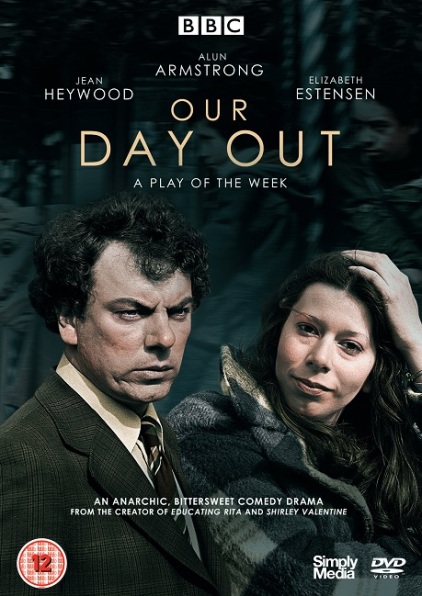
Mrs Kay (Jean Haywood) runs a remedial class for illiterate children. Along with the long-suffering Mr Briggs (Alun Armstrong) and two younger teachers – Susan (Elizabeth Estensen) and Colin (Lennox Greaves) – she escorts her unruly mob on a day trip from Liverpool to Conwy Castle in North Wales. For Mr Briggs, it’s a day of considerable stress ….
Drawing on his own experiences of school trips (both as a teacher and a child) Our Day Out is a typically perceptive slice of drama from Willy Russell. Originally broadcast in December 1977 as part of the Play of the Week strand, it obviously struck an immediate chord with the audience as it was swiftly repeated just a few months later (this time as a Play For Today).
Although he wrote the play in just four days, it was a subject he’d been mulling over for some considerable time. Later turned into a musical, the original BBC play is one which Russell still regards with fondness today. “The performances are exquisite. Shot on 16mm in just three weeks by a first time director working with a largely untrained cast it just seemed to be one of those charmed ventures in which everything just fell into place”.
Mrs Kay and Mr Briggs are two very different types of teacher – she’s the free and easy type whilst he’s stern and controlling. Which method works best? Mr Briggs maintains that you need discipline in order to make any headway in teaching these types of children but Mrs Kay – in a late set-piece monologue – is totally dismissive of this attitude. Society at large, she maintains, doesn’t want them schooled – after all, if they were then where would the next generation of factory fodder come from?

This is the most overtly political point in a play where the thorny topic of inner-city deprivation is never far from the surface. The difference between the streets of Liverpool (shown here in all their grimy 1970’s glory) and the countryside of Wales is marked, especially since it’s made plain than most of the children have never gone further than Birkenhead before. There’s a yearning melancholy on display from some of them which is heartbreaking – they want a better life, but there’s a sense that the system just won’t allow it.
The gulf in acting experience between the adult cast and the children is one of the most intriguing things about Our Day Out. None of the children had acted before (and most wouldn’t again) which gives their performances a very natural and unaffected air. To balance this, you have experienced actors such as Jean Haywood and Alun Armstrong in the central roles as well as decent cameos from the likes of George Malpas, Robert Gillespie and Peter Tilbury.
En route to the castle, they stop off twice – first at a motorway cafe and then at a zoo. It does beggar belief that both times Mr Briggs would let them roam unsupervised – with the result that they pilfer all the sweets from the cafe and later attempt to steal half the zoo! This latter moment is high on comic value but low on credibility. However it allows Armstrong (who is excellent throughout) a moment of high intensity as he roundly berates the children.
As you might expect, he eventually begins to relent and it’s his clifftop encounter with young Carol (Julie Jones) which is key. Jones tackles the substantial role of Carol with such gusto that it’s a real shame she didn’t continue acting. Desperate to stay in Wales rather than return to her miserable existence in Liverpool, there follows a tense scene where Mr Briggs attempts to talk her back from the cliff edge. This he does and the emotional connection he makes with her helps him to finally unbend.
A late visit to the funfair – his idea – ends the day on a happier note, but as the coach returns to Liverpool it’s easy to see Mr Briggs’ relaxed spirit slowly dissipating. Will he modify his approach in future or simply revert to his stern ways once they’re back at school? This is left unresolved, but there’s one key moment which suggests that the latter course is the most likely.
Deftly juggling comedy with more serious themes, Our Day Out is a gem of a play which at 67 minutes doesn’t outstay its welcome. Alun Armstrong is outstanding, but none of the cast disappoint and it’s the sort of play which should have considerable replay value.
Our Day Out is released by Simply Media on the 1st of October 2018, RRP £9.99. It can be ordered directly from Simply here (quoting ARCHIVE10 will apply a 10% discount).




